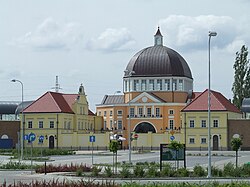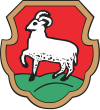Piaseczno
| Piaseczno | |||
|---|---|---|---|

Fashion House, opened in 2006
|
|||
|
|||
| Coordinates: 52°4′0″N 21°1′0″E / 52.06667°N 21.01667°E | |||
| Country |
|
||
| Voivodeship | Masovian | ||
| County | Piaseczno County | ||
| Gmina | Gmina Piaseczno | ||
| Established | 14th century | ||
| Town rights | 1429 | ||
| Government | |||
| • Mayor | Zdzisław Lis | ||
| Area | |||
| • Total | 16.33 km2 (6.31 sq mi) | ||
| Population (2015) | |||
| • Total | 43,540 | ||
| • Density | 2,700/km2 (6,900/sq mi) | ||
| Time zone | CET (UTC+1) | ||
| • Summer (DST) | CEST (UTC+2) | ||
| Postal code | 05-500 | ||
| Area code(s) | +48 022 | ||
| Car plates | WPI | ||
| Website | http://www.piaseczno.eu/ | ||
Piaseczno [pʲaˈsɛt͡ʂnɔ] is a town in central Poland with 43,540 inhabitants (2015). It is situated in the Masovian Voivodeship, approximately 16 kilometres (10 miles) south of Warsaw. It is a popular residential area and a suburb of Warsaw and is strongly linked to the capital, both economically and culturally. It is the capital of Piaseczno County.
The origins of the city dates from a village in the 13th century when it was part of Bohemia, located on the route between Warsaw and Czerskiem. Its strategic position meant that the village grew quickly. On 5 November 1429 the town obtained a charter, and soon became a local market. A further charter was confirmed in 1461.
In 1537 the town became Royal property and in the second half of the 16th century reached 1200 inhabitants based round the brewing and transport industries. However, the city suffered setbacks because of numerous fires in the late 16th and early 17th centuries but returned to its former glory in the first half of the 18th century.
The town church was built in 1736 by architect Carl Frederick Pöppelmann and during the second partition of Poland the city was burned during the Battle of Gołków which took place on 9 and 10 July 1794. Only a church and few houses survived.
From 1806 to 1807 a French cavalry unit was stationed in the town as part of the Napoleonic wars, and from 1808 to 1811 this was replaced by the Polish 1st Regiment mounted rifles. The Congress of Vienna, saw the area ceded to Russia in 1815.
...
Wikipedia



